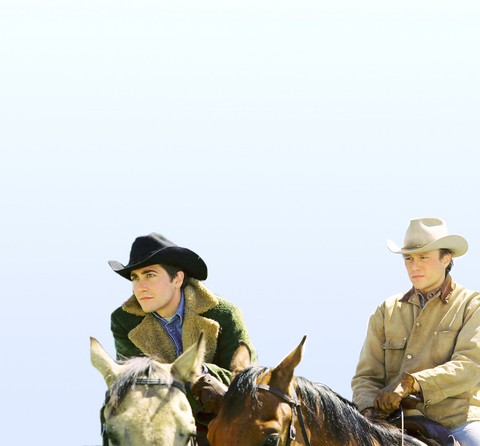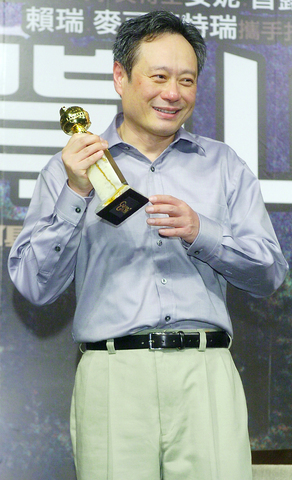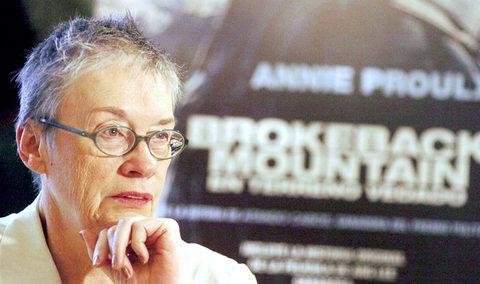The lonesome chill that seeps through Ang Lee's (
One night, when their campfire dies, and the biting cold drives them to huddle together in a bedroll, a sudden spark between Ennis Del Mar (Heath Ledger) and Jack Twist (Jake Gyllenhaal) flares into an undying flame.
The same mood of acute desolation permeates the spare, gnarly prose of Annie Proulx's short story, first published in The New Yorker in 1997, adapted by Larry McMurtry and Diana Ossana. McMurtry knows about loneliness. Its ache suffused his novel and his screenplay for The Last Picture Show, made into a film 34 years ago by Peter Bogdanovich.

The sexual bouts between these two ranch hands who have never heard the term gay (in 1963, when the story begins, it was still a code word transiting into the mainstream) are described by Proulx as "quick, rough, laughing and snorting."
That's exactly how Lee films their first sexual grappling (discreetly) in the shadows of the cramped little tent. The next morning, Ennis mumbles, "I'm no queer." And Jack replies, "Me neither." Still, they do it again, and again, in the daylight as well as at night. Sometimes their pent-up passions explode in ferocious roughhouse that is indistinguishable from fighting.
This moving and majestic film would be a landmark if only because it is the first Hollywood movie to unmask the homoerotic strain in American culture that Leslie Fiedler discerned in his notorious 1948 Partisan Review essay, Come Back to the Raft Ag'in, Huck Honey. Fiedler characterized the bond between Huckle-berry Finn and Jim, a runaway slave, as an unconscious romantic attachment shared by two males of different races as they flee the more

PHOTO: CHEN YI-CHUAN, TAIPEI TIMES
constraining and civilizing domain of women. He went on to identify that bond as a recurrent theme in American literature.
In popular culture, Fiedler's Freudianism certainly could be applied to the Lone Ranger and Tonto. Minus the ethnic division, it might also be widened to include a long line of westerns and buddy movies, from Red River to Midnight Cowboy to Butch Cassidy and the Sundance Kid: the pure male bonding that dare not explore its shadow side.
Ennis and Jack's 20-year romance begins when they are hired in the summer of 1963 by Joe Aguirre (Randy Quaid), a hard-boiled rancher, to work as sheepherders on Brokeback Mountain in the Wyoming high country. (The movie was filmed in Alberta, in the Canadian Rockies.) Subsisting mostly on canned beans and whiskey, the two cowboys develop a boozy friendship by the campfire.

PHOTO: EPA
So taciturn and bottled up that he swallows his syllables as he pulls words out of his mouth in gruff, reluctant grunts, Ennis tells Jack of being raised by a brother and sister after his parents died in a car crash. Jack, brought up in the rodeo, is more talkative and recalls his lifelong alienation from his father, a bull rider.
When signs of an early blizzard cut short their summer employment, Ennis and Jack go their separate ways. Ennis' farewell is a simple "See you around." Both, though, are torn up. Ennis marries his girlfriend, Alma (Michelle Williams), and they have two daughters. Jack meets and marries Lureen (Anne Hathaway), a Texan rodeo queen, with whom he has a son, and joins her father's farm-equipment business.
Four years pass before Jack, who is living in Texas, sends a general-delivery postcard to Ennis, who has settled in Wyoming, saying he will be in the area and would like to visit. The instant they set eyes on each other, their suspended passion erupts into a spontan-eous clinch. Alma sees it all, and her face, from that moment on, remains frozen in misery. The reunited lovers rush to a motel.
So begins a sporadic and tormented affair in which the two meet once or twice a year for fishing trips on which no fish are caught. Jack urges that they forsake their marriages and set up a ranch together. But Ennis, haunted by a childhood memory of his father taking him to see the mutilated body of a rancher,
tortured and beaten to death with a tire iron for living with another man, is immobilized by fear and shame.
Both Ledger and Gyllenhaal make this anguished love story physically palpable. Ledger magically and mysteriously disappears beneath the skin of his lean, sinewy character. It is a great screen performance, as good as the best of Marlon Brando and Sean Penn. The pain and disappointment felt by Jack, who is softer, more self-aware and self-accepting, continually registers in Gyllenhaal's sad, expectant silver-dollar eyes.
The second half of the movie opens up Proulx's story to follow both men's slowly crumbling marriages. For years, Alma chokes on her pain until one day, after she and Ennis have divorced, it rises up as if she were strangling on her own bile. As Jack, desperately frustrated, has clandestine encounters with other men, Hathaway's Lureen slowly calcifies into a clenched robotic shell of her peppery younger self.
Brokeback Mountain is not quite the period piece that some would like to imagine. America's squeaky closet doors may have swung open far enough for a gay rodeo circuit to flourish. But let's not kid ourselves. In large segments of American society, especially in sports and the military, those doors remain sealed. The murder of Matthew Shepard, after all, took place in Brokeback territory. Another recent film, Jarhead (in which Gyllenhaal plays a marine), suggests how any kind of male behavior perceived as soft and feminine within certain closed male environments triggers abuse and violence and how that repression of sexual energy is directly channeled into warfare.
Yet Brokeback Mountain is ultimately not about sex (there is very little of it in the film) but about love: love stumbled into, love thwarted, love held sorrowfully in the heart.
Or, as Proulx writes, "What Jack remembered and craved in a way he could neither help nor understand was the time that distant summer on Brokeback when Ennis had come up behind him and pulled him close, the silent embrace satisfying some shared and sexless hunger."
One tender moment's reprieve from loneliness can illuminate a life.

That US assistance was a model for Taiwan’s spectacular development success was early recognized by policymakers and analysts. In a report to the US Congress for the fiscal year 1962, former President John F. Kennedy noted Taiwan’s “rapid economic growth,” was “producing a substantial net gain in living.” Kennedy had a stake in Taiwan’s achievements and the US’ official development assistance (ODA) in general: In September 1961, his entreaty to make the 1960s a “decade of development,” and an accompanying proposal for dedicated legislation to this end, had been formalized by congressional passage of the Foreign Assistance Act. Two

Despite the intense sunshine, we were hardly breaking a sweat as we cruised along the flat, dedicated bike lane, well protected from the heat by a canopy of trees. The electric assist on the bikes likely made a difference, too. Far removed from the bustle and noise of the Taichung traffic, we admired the serene rural scenery, making our way over rivers, alongside rice paddies and through pear orchards. Our route for the day covered two bike paths that connect in Fengyuan District (豐原) and are best done together. The Hou-Feng Bike Path (后豐鐵馬道) runs southward from Houli District (后里) while the

March 31 to April 6 On May 13, 1950, National Taiwan University Hospital otolaryngologist Su You-peng (蘇友鵬) was summoned to the director’s office. He thought someone had complained about him practicing the violin at night, but when he entered the room, he knew something was terribly wrong. He saw several burly men who appeared to be government secret agents, and three other resident doctors: internist Hsu Chiang (許強), dermatologist Hu Pao-chen (胡寶珍) and ophthalmologist Hu Hsin-lin (胡鑫麟). They were handcuffed, herded onto two jeeps and taken to the Secrecy Bureau (保密局) for questioning. Su was still in his doctor’s robes at

Mirror mirror on the wall, what’s the fairest Disney live-action remake of them all? Wait, mirror. Hold on a second. Maybe choosing from the likes of Alice in Wonderland (2010), Mulan (2020) and The Lion King (2019) isn’t such a good idea. Mirror, on second thought, what’s on Netflix? Even the most devoted fans would have to acknowledge that these have not been the most illustrious illustrations of Disney magic. At their best (Pete’s Dragon? Cinderella?) they breathe life into old classics that could use a little updating. At their worst, well, blue Will Smith. Given the rapacious rate of remakes in modern